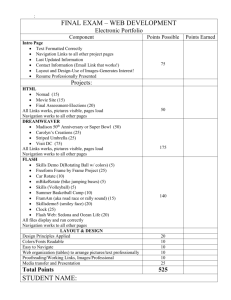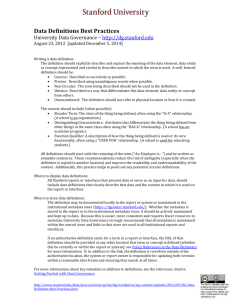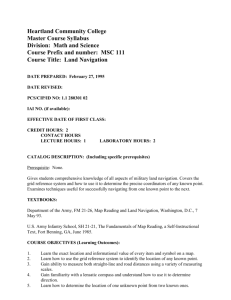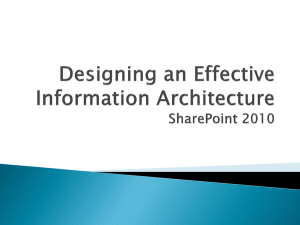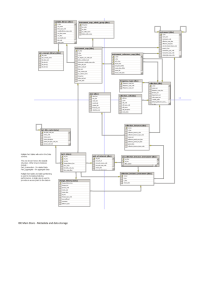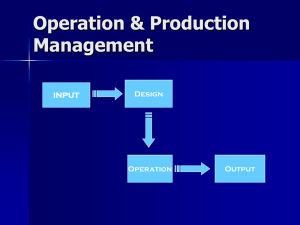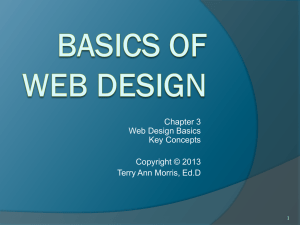The Middle East
advertisement
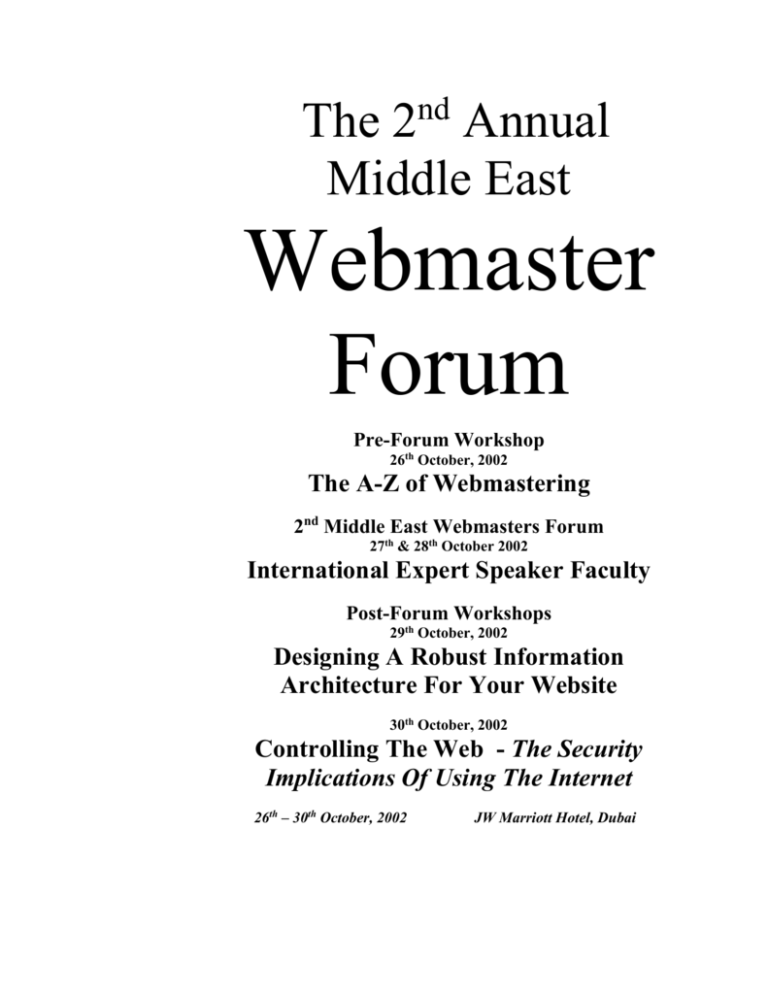
nd The 2 Annual Middle East Webmaster Forum Pre-Forum Workshop 26th October, 2002 The A-Z of Webmastering 2nd Middle East Webmasters Forum 27th & 28th October 2002 International Expert Speaker Faculty Post-Forum Workshops 29th October, 2002 Designing A Robust Information Architecture For Your Website 30th October, 2002 Controlling The Web - The Security Implications Of Using The Internet 26th – 30th October, 2002 JW Marriott Hotel, Dubai Endorsed by IWA Logo http://www.iwa-italy.org/images/logo/iwa2inch.tif Supported by W3C World Wide Web Consortium Logo Expert Speaker Faculty http://www.w3.org/Icons/w3c_logo.eps Left hand panel Idyll Mountain, USA Dubai Internet City, UAE W3C - World Wide Web Consortium, France Bayt.com, UAE Sapphire Technologies Ltd., UK Cyber Gear, UAE Advanced Technology Group, UK Gerry McGovern, Ireland Makook, UAE Diamond Bullet Design, USA Arabia Online, Jordan Makook, UAE Horizons, Qatar Saturday 26th October, 2002 Registration and coffee will be at 08:00; the course will begin punctually at 08:30. Coffee and refreshments will be served mid-morning and mid-afternoon. Luncheon will be at 13:00. The workshop will close at 17:00. Pre-Forum Workshop: The A - Z Of Webmastering This pre-forum workshop covers the essentials of Webmastering, examining all aspects of the role, from Accessibility to XML and, most importantly, how this relates to your job as a Webmaster. By acquiring knowledge of the latest techniques and by reexamining the fundamental skills you will be provided with the necessary expertise to deliver your organisation’s expectations from the Web. NEED INTRO ‘OBJECTIVES’ – ‘WHY SHOULD YOU ATTEND’-‘WHO SHOULD ATTEND’. Key Concepts Of Webmastering Accessibility Browsers CSS Design The Roles Of The Webmaster Educator Facilitator Graphic Artist Human Factors Engineer Integrator Jack-of-all-Trades Utilizing Web Technologies K Log Analysis and Evaluation Multimedia N Online Commerce Programming for the Web Q Web Best Practices Record Keeping Standards Testing Usability Validation The Future Of Webmastering Webmastering as a Profession XMLization Your Role on the Web Z Meet Your Workshop Leader: Kynn Bartlett has been working on the Web since 1994 and is especially interested in universal accessibility. As president of the HTML Writers Guild, Kynn founded the AWARE Center in 1999 to promote accessible Web design, and he teaches online courses in Web accessibility. In addition to writing, speaking at conferences, and teaching online courses, Kynn is the cofounder of Idyll Mountain Internet, a Web development company. In his free time, he has an assortment of geek hobbies, documented in detail at http://kynn.com/. Kynn lives somewhere in southern California with his wife Liz and three large black dogs. His first book, "Teach Yourself Cascading Style Sheets in 24 Hours" was published in July 2002. (NEED QUALIFICATIONS) Sunday 27th October, 2002 08:00 Registration and coffee 08:30 Welcome And Opening Remarks From The Forum Chairman Kynn Bartlett, Chief Technologist Idyll Mountain, USA 08:45 Keynote Address: AWAITING TOPIC Dr. Omar Bin Sulaiman, CEO Dubai Internet City, UAE TBC 09:30 Protecting Your Innovation Through Web Standards Explores the mission, principles and operational process of the W3C Overview of current technologies such as: Web Services Semantic Web Graphics Mobile Computing Accessibility Agent Software Demonstrate the benefits of using Web standards Vendor independence Interoperability Evolve-ability Daniel Dardailler, Director Europe Operations W3C - World Wide Web Consortium, France 10:30 Networking break with coffee and refreshments 10:45 Case Study: Bayt.com TOPIC TBC Rabea Ataya, CEO Bayt.com, UAE 11:30 Information Security And BS7799: A Code Of Practice For Information Security Management Brief history of the Code of practice Description of the key points from the standard How can your organisation be formally certified? BS7799, the British Code of Practice for Information Security Management Systems, is being adopted globally as the definitive text on a standardised means of measuring security. Keith Foggon, Director of Security Sapphire Technologies Ltd., UK 12:30 Networking luncheon for delegates and speakers 14:00 Web Usability And Accessibility – Go The Extra Mile Evaluates the benefits of ensuring universal accessibility to data in both government and corporate websites. Correct implementations of HTML Access for all Mandatory UK Government guidance W3C WAI guidance The use of specialist browsers Multi-modal publishing Validating a website Neil Pawley, Senior Technology Analyst Advanced Technology Group, UK 14:45 Universality of the 21st Century Web The biggest Webmastering challenge of this decade lies in meeting the promise inherent in the name of the "World Wide Web" – a communications medium that can be used by everyone, without restriction. To achieve this, a Web developer must understand accessibility by disabled users, internationalization, cultural and subculture adaptation and more to achieve true universal usability. This presentation will cover how to reach those audiences, which would otherwise be shut out from the global Internet experience. Kynn Bartlett, Chief Technologist Idyll Mountain, USA 15:45 Networking break with coffee and refreshments 16:00 Developing A Professional Content Management Strategy Whether you are managing an eCommerce website, an Intranet, a government website or a business-to-business portal, content is your most valuable resource. Developing a professional content management strategy will mean that you be able to: Make sure that you are getting the right content to the right person at the right time at the right cost Make it easier for your staff to create, edit and publish content, and make it easier to manage all these processes Eliminate technical hurdles in the publication of content, thus reducing the need for training Allow for the design of a common information architecture, dealing with metadata, classification, navigation, search, design and layout Gerry McGovern, Author, Speaker and Consultant Ireland 17:00 Open Forum Discussion 17:30 Close of day one and remarks from the Co-Chairman Monday 28th October, 2002 08:30 Opening Remarks From The Forum Co-Chairman Neil Pawley, Senior Technology Analyst Advanced Technology Group, UK 08:45 Delivering Actual Return On Investment Through User Testing This paper will examine, review and analyse actual case studies of deployed web projects. of return on investment studies. Presenting real monetary gains from actual Stephen Markel, President and CEO Diamond Bullet Design, USA 09:45 Web Services: It Is Your Call! The question: “Make or buy?" has now been replaced with Internet version: "make or subscribe?” Even with growth of service providers and the need to focus on the Company’s core business, the decision whether to build your own applications, or subscribe to an existing one, should be well evaluated. This presentation examines the pros and cons. Shadi A. Eideh, IT & Projects Director Arabia Online, Jordan 10:30 Networking break with coffee and refreshments 11:00 Web Development Methodologies: What Works And What Does Not. The Internet has thrown in to sharp focus the Developers’ perennial and paradoxical challenge: Produce better quality products in less time. This presentation is examines the essential processes and workflows that are needed to have a solid, and at the same time a versatile software development process, which delivers the shortest time to market and quality applications. Shadi A. Eideh, IT & Projects Director Arabia Online, Jordan 11:45 Building A Brand Click By Click Sharad Agarwal, CEO Cyber Gear, UAE 12:45 Networking luncheon for delegates and speakers 14:15 Better Information Faster - Metadata Is The Key Metadata is the key element for efficient access and retrieval of data resources. But implementation needs to be coordinated and standardised for it to be of use. What is metadata? Examples of metadata implementations Using correctly Can standards such as Dublin Core be enforced? What is the UK government doing? What about the international community? Extending metadata elements RDF and the future of data cataloguing What is the Semantic Web? Neil Pawley, Senior Technology Analyst Advanced Technology Group, UK 15:15 Case Study: Al Jazeera - Creating An Arabic Rich Presence On The Web Mohamad Takriti, CEO Horizons, Qatar 16:15 Panel Discussion Delegates will be able to address all of the speakers from the preceding two days and put their most provoking questions to our panel of international experts Led by: Kynn Bartlett, Chief Technologist Idyll Mountain, USA And Neil Pawley, Senior Technology Analyst Advanced Technology Group, UK 17:00 End of Forum and Closing Remarks from the Co-Chairmen Tuesday 29th October, 2002 Registration and coffee will be at 08:00; the course will begin at 08:30. Coffee and refreshments will be served mid-morning and mid-afternoon. Luncheon will be at 13:00. The workshop will conclude at 17:00. Post-Forum Workshop: Designing A Robust Information Architecture For Your Website This workshop deals with the effective organization and layout of content on a website so that your content can be found quickly and read easily. You will learn about the critical building blocks of information architecture: metadata and classification; navigation; search; layout and graphic design. You will learn about best practice in the above areas through extensive examples and practical exercises. The workshop is broken down into five parts: Part 1: Information architecture fundamentals Part 2: Metadata and classification Part 3: Navigation Part 4: Search Part 5: Layout and design Part 1: Information architecture fundamentals You will learn: What information architecture is Why it is so important Why there are four key pillars of information architecture (metadata and classification; navigation, search; layout and graphic design) Why standards are so important in information architecture design The key differences between information architecture design and graphic design, and why information architecture design should always lead The role of the information architect Why, as always, the reader is king of information architecture design Part 2: Metadata and classification You will learn: What metadata is Why XML is an emerging metadata standard The purpose and benefits of metadata Metadata design guidelines Why document templates are important What classification is Why the larger the website is, the more critical classification becomes Guidelines for better classification A step-by-step approach for classification design Part 3: Navigation You will learn: What navigation is and why it’s so critical Why navigation has little to do with graphics and everything to do with functionality The relationship between navigation and classification The relationship between navigation and search Why navigation should be ‘written in stone’ Ten principles for better navigation design Thirteen navigation options that give the reader control over how they would like to navigate through a website Part 4: Search You will learn: The fundamentals of quality search How to present basic search How advanced search should be designed Best practice in laying out search results Part 5: Layout and design You will learn: How web publishing principles should always drive layout and graphic design Web layout and design fundamentals The importance of headings and summaries in homepage design Layout design principles for documents, forms and email newsletters Layout and graphic design issues relating to mastheads Layout and graphic design issues relating to footers Why accessibility is a crucial part of web layout and graphic design Meet Your Workshop Leader: Gerry McGovern has spoken, written and consulted extensively on Web content and knowledge management issues over the last eight years. His areas of speciality are: Development of a knowledge and content management strategy, for which he has created a proprietary methodology. Writing and laying out content for the Web Information architecture design (metadata, classification, navigation, search) In October 2001, he published two books with Financial Times Prentice Hall, entitled: Content Critical and The Web Content Style Guide. Design Research News stated that Content Critical, "should be on the reading list of every course in Web design." Knowledge Management Review described it as a "bible" of content management. Gerry is editor of the e-business section of BOSS, a one-stop reference and interactive tool embracing all aspects of the world of work. BOSS is published by Bloomsbury, and at over 3 million words, is one of the largest publishing projects of its kind. He is a member of Financial Times Knowledge Dialogue, a select group of ‘thought leaders’ who advise senior executives on organizational issues. For Knowledge Dialogue, Gerry’s area of specialty is knowledge and content management. In October 2000, he received the Web Ireland Internet Industry Person of the Year award. Previously, Gerry was founder and chief executive officer of Nua, a developer of content management software and solutions. Nua customers included Lucent Technologies and Thomas Publishing. In 1996, Nua received the Best Overall World Wide Web Business Achievement award from the European Union. Nua is perhaps best known for Nua Internet Surveys, a popular publication tracking Internet trends. Since 1996, Gerry has written New Thinking, a widely read weekly email newsletter covering the role of content on the Web. In 1999, Gerry published The Caring Economy (Blackhall Publishing), which was voted 25th out of the top 50 new economy books by Middleton/Capstone. Gerry McGovern holds a B.Sc. Man. from Trinity College, Dublin. Wednesday 30th October, 2002 Registration and coffee will be at 08:00; the course will begin at 08:30. Coffee and refreshments will be served mid-morning and mid-afternoon. Luncheon will be at 13:00. The workshop will conclude at 17:00. Post-Forum Workshop: Controlling The Web – An Overview Of The Security Implications Of Using The Internet The workshop will introduce delegates to the security issues of using the Internet for business functions. Whether it is for email, Web access or the transfer of files or data, this workshop will highlight the critical areas of security, which all organisations should address. Objectives: To focus upon the security issues of the Internet and to raise awareness of the means by which these security concerns can be addressed. Concentrating on the range of Internetborne threats and recommended countermeasures the Workshop will cover the range of issues from computer viruses, hacking, intrusion detection, spamming, defacements, firewalling and Internet abuse. The workshop will cover: Firewalls Intrusion detection BS7799 (in summary) Hacking exploits Computer Forensics Remote Access Virtual Private Networks Encryption PKI Computer Viruses Risk Assessment and Management Audit and Security NEEDS MORE COPY: WHO SHOULD ATTEND: WHY SHOULD YOU ATTEND Meet Your Workshop Leader: Keith Foggon is the Director of Security for Sapphire Technologies Ltd. Spending over 20 years within the fields of IT Audit and Security, and working in both public and private sectors Keith brings a wealth of experience in all aspects of information security management. Keith is a QiCA qualified professional auditor, Chairs the UK’s BS7799 User’s Group Steering Committee and Chairs the Institute of Internal Auditor’s Information Security Special Interest Group. Keith is also registered by the British Computer Society as a Security Practitioner, approved by CESG as a CLAS consultant and has written professional briefing notes on information security issues. BACK PAGE COPY & PASTE & ALTER DETAILS
